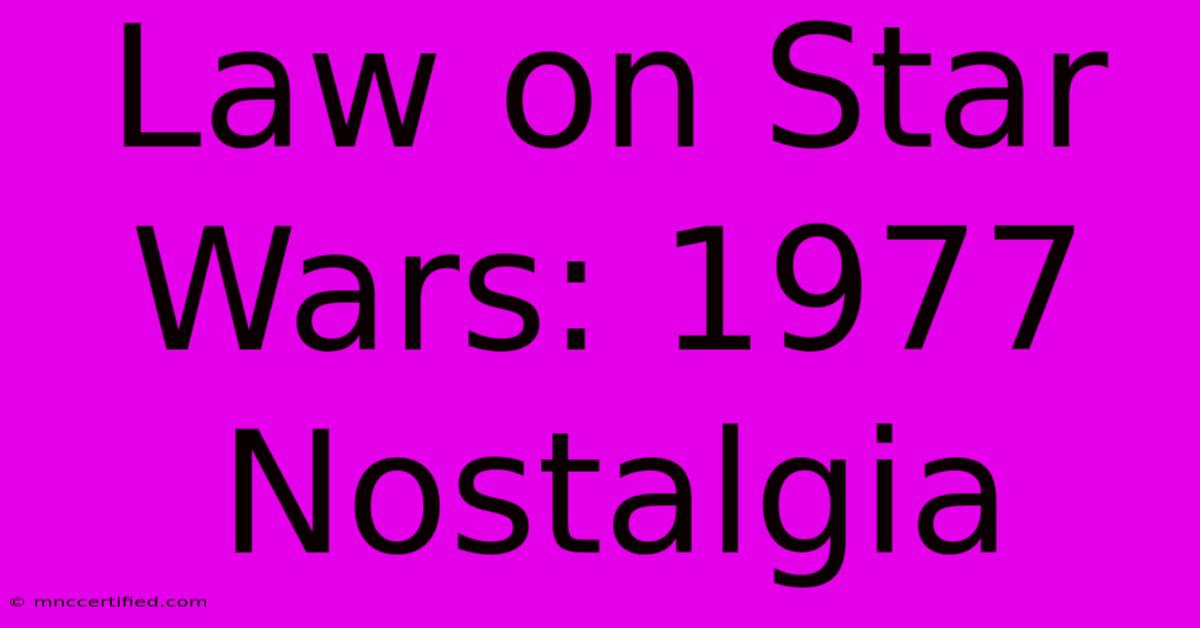Law On Star Wars: 1977 Nostalgia

Table of Contents
Law on Star Wars: 1977 Nostalgia - A Galactic Legal Exploration
The year is 1977. A galaxy far, far away explodes onto the silver screen, captivating audiences worldwide with its groundbreaking special effects, compelling characters, and epic storytelling. Star Wars: A New Hope wasn't just a movie; it was a cultural phenomenon that continues to resonate today. But beyond the lightsabers and the Force, there's a fascinating legal landscape surrounding this cinematic masterpiece and its enduring legacy of nostalgia.
The Legal Protection of a Cultural Icon
The legal framework protecting Star Wars and its intellectual property is multifaceted and robust. Copyright law is paramount, protecting the original screenplay, the film itself, the music, and the various characters' designs. Trademark law safeguards the use of the Star Wars name, logos, and specific character names (like Darth Vader or Luke Skywalker) to prevent unauthorized commercial exploitation. These legal protections are crucial in maintaining the integrity of the franchise and preventing the dilution of its brand value. The original copyrights, granted to George Lucas and subsequently transferred and/or licensed, have been strategically renewed and extended over the decades, ensuring that Lucasfilm, now a subsidiary of Disney, maintains significant control.
Copyright Infringement and Fan Works
The enduring popularity of Star Wars has led to a significant amount of fan-created content, ranging from artwork and fanfiction to cosplay and even fan films. While some fan works fall under the principle of fair use, allowing for limited transformative use without infringing copyright, others risk legal action. The line between homage and infringement can be blurry, and Lucasfilm has taken action in the past against projects deemed too commercially exploitative or damaging to their brand. This demonstrates the importance of understanding fair use principles when creating fan content and proactively seeking legal counsel if uncertain. The legal battleground around fan works constantly evolves, creating ongoing discussion about the balance between creative expression and intellectual property rights.
The Economics of Nostalgia: Merchandising and Licensing
The enduring power of Star Wars nostalgia is clearly visible in its lucrative merchandising and licensing agreements. The sale of toys, clothing, games, and countless other products bearing the Star Wars brand generates billions of dollars annually. This demonstrates the significant economic value of legally protecting intellectual property, particularly a property with such a devoted fanbase and global reach. The legal frameworks surrounding licensing agreements are complex, ensuring that Lucasfilm maintains strict control over the quality and consistency of its branded products.
Nostalgia Marketing and Brand Management
The use of nostalgia in marketing is a powerful strategy, and Disney and Lucasfilm have skillfully leveraged the Star Wars brand’s 1977 origins to resonate with both original fans and new generations. This requires careful brand management to avoid alienating the loyal fanbase while attracting new audiences. The legal team plays a critical role in ensuring that any marketing campaigns stay true to the brand's identity and avoid any potential legal pitfalls.
The Future of Star Wars Law
As the Star Wars franchise continues to expand with new films, television series, and other media, its legal landscape will inevitably evolve. New challenges may arise, particularly concerning the use of artificial intelligence in creating new content and the potential impact on copyright law. The ongoing legal protection of Star Wars intellectual property remains vital for ensuring its continued success and preservation for future generations. The legacy of 1977's Star Wars extends far beyond the screen; it's deeply embedded in a complex web of law, economics, and culture, showing the powerful intersection of legal protection and enduring cultural impact.

Thank you for visiting our website wich cover about Law On Star Wars: 1977 Nostalgia. We hope the information provided has been useful to you. Feel free to contact us if you have any questions or need further assistance. See you next time and dont miss to bookmark.
Featured Posts
-
Jerry Schitea Fisher Investments
Nov 22, 2024
-
Skubal And Sales Cy Young Season
Nov 22, 2024
-
De Generes De Rossi Reported Us Departure
Nov 22, 2024
-
Putin Russias New Missile Targets Ukraine
Nov 22, 2024
-
How Does A Man Invest In A Woman
Nov 22, 2024